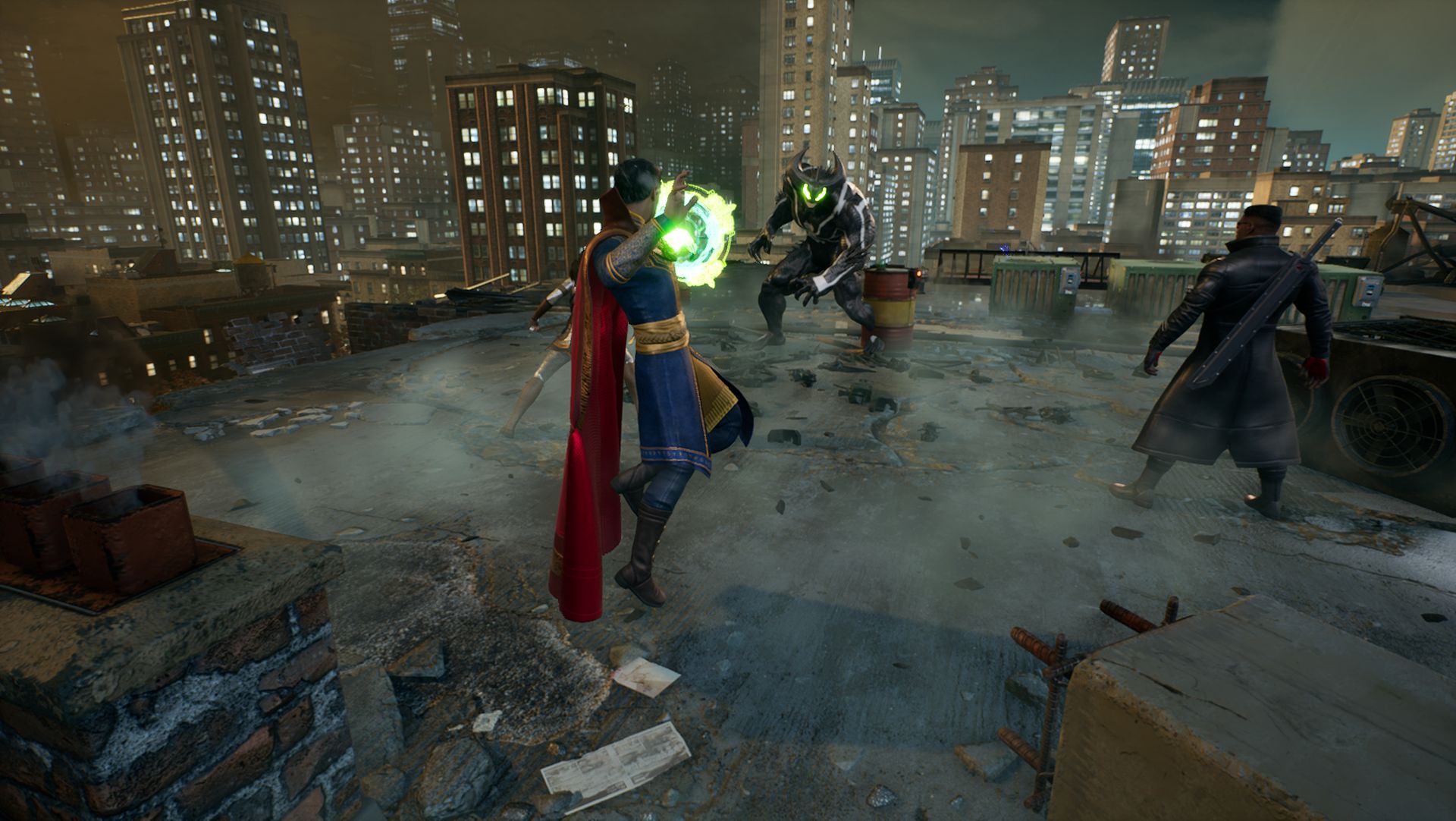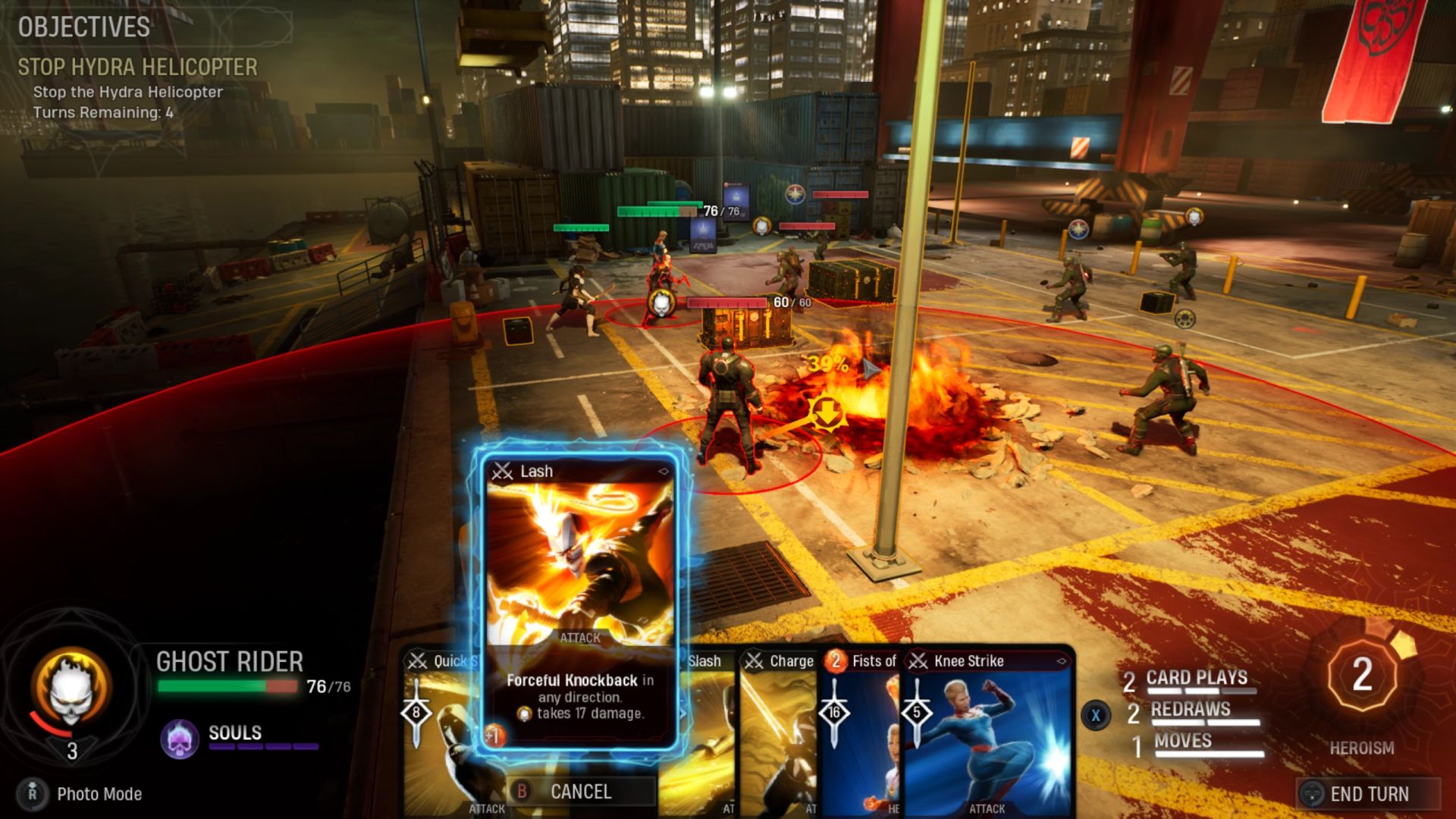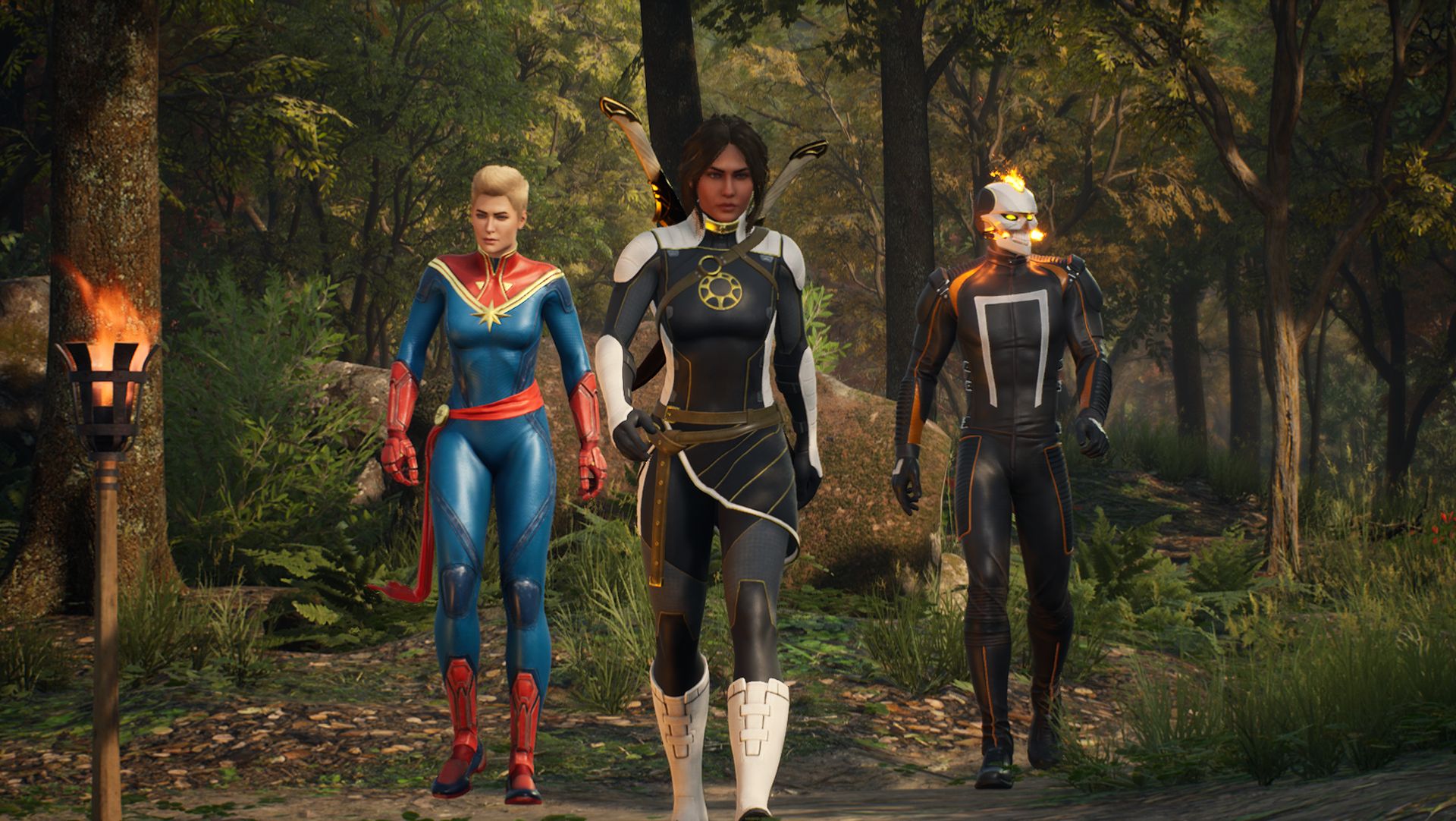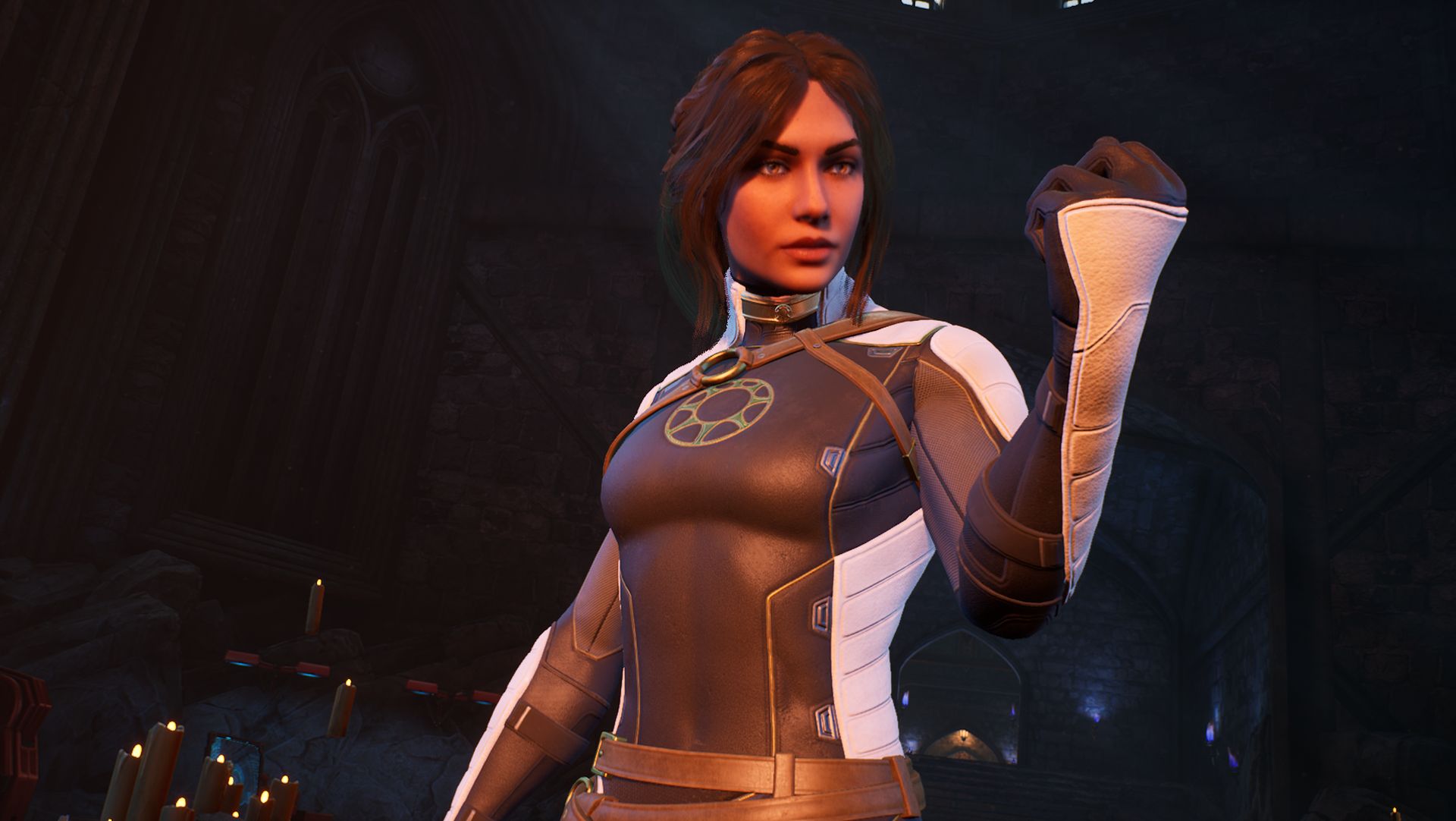Our Verdict
Who knew Sid Meier's protégés had a secret, and completely brilliant, Persona game in them?
PC Gamer's got your back
What is it? A Marvel friendship simulator masquerading as a turn-based XCOM-alike.
Expect to pay: $59.99 / £49.99
Release date: December 2, 2022
Developer: Firaxis Games
Publisher: 2K
Reviewed on: Windows 10, AMD Ryzen 5 5600X Six Core CPU, 16GB RAM, Nvidia Geforce RTX 3060
Multiplayer? No
Link: Official site
The team behind XCOM has given me my next mission objective. It’s not to destroy an alien relay, extract a VIP from a hot zone, or board a crashed UFO. Instead, I’m to watch a movie with a friend in Marvel's Midnight Suns. A western, if the Eastwood-esque figure flashing across the television set is anything to go by, though the particulars of the film’s plot turn out to be unimportant.
Movie night is merely a pretext to have a deep conversation with a new teammate, named Nico. We bond over our evil moms: hers a philanthropist sorceress who murdered children, mine a demonic goddess who banished me to a cold grave in the late 17th century. Nico, whose superpower appears to be cheeriness in the face of trauma, resolves to catch me up on the entire history of motion pictures: "The first thing you need to know—the glowing briefcase is a metaphor."

So goes my first night in the Abbey, the picturesque fortress around which all the action of Midnight Suns revolves. I've long since settled in, hanging classic paintings from the austere walls of my chamber, setting up a plush bed for Charlie the hellhound, and picking the spooky estate grounds clean of reagents to throw into the library's cauldron. Yet tens of hours later, I've never stopped unpacking baggage with my various magical, irradiated, or vampiric roomies. It's a surprise I still haven't gotten over, or stopped appreciating: Firaxis's big-budget contribution to the Marvel universe is just as dedicated a downtime simulator as it is a turn-based tactics game. And despite the studio's expertise historically skewing toward the latter, Midnight Suns is equally accomplished in both fields.
In retrospect, you can trace a line from the last project Jake Solomon directed, XCOM 2: War of the Chosen, to this one. Back then, Firaxis emphasised the bonds between your soldiers with shared moves, and introduced a trio of taunting supervillains—who, in their reptilian loftiness, bear more than a passing resemblance to Midnight Suns' big bad, Lilith. The developer's new effort represents a doubling down, or perhaps even a quadrupling, of those elements. It's all about fusing ever tighter with your teammates in an attempt to combat nemeses who, despite repeated pummellings in rooftop arena battles, refuse to stay down. The minions of Hydra are but set dressing in these ongoing relationship dramas - convenient nearby objects to pick up and smash Sabretooth or Crossbones across the chops with.
Ex-Com
When I interviewed Solomon at the end of last year, he described the combat in Midnight Suns as the opposite of XCOM. That's not to say conflicts are resolved in the form of a capella sing-offs, but rather that the studio has rejected its previous reliance on probability as a tool for tension and emergent storytelling. There's only one instance in which a percentage figure appears on-screen—in the moments when you attempt to knock an enemy into a New York sinkhole or abyssal vortex for an instakill (extra points to Firaxis' animators for the way they teeter on the edge, hands flailing but not giving away the outcome). At every other time, Midnight Suns deals in the deterministic math of Into the Breach—doing away with mystery to show you exactly which of your heroes will be crushed beneath Venom's hurled debris next turn, and precisely how much damage they'll take in the process.

The upfront numbers make it possible, and in fact desirable, to calculate the results of your entire turn before you begin it. If your team of three heroes can K.O. every enemy on the board before you run out of plays, then that's match end—an early victory that comes with a bonus in Gloss, the currency used to buy your comrades gifts and renovate the Abbey. If not, you can expect more goons to flood the screen on your next turn, and the one after that.
This potential for weaponising the environment during extended, bloodless beatings in a cramped arena lends Midnight Suns the feel of hardcore WWE.
Yet you rarely feel like you're drowning. Since this is a Marvel fantasy, every hero in your roster can one-shot a minion without breaking a sweat—and every fresh Hydra body is an opportunity to flex by flinging an opponent into an explosive barrel with Ghost Rider's flaming chain, or knocking them upside their head with a stack of New York newspapers. All the while, you'll take any opportunity to tip a lamppost onto a more significant henchman, chipping away at their health bar until you can deliver that final, match-ending knockout. This potential for weaponising the environment during extended, bloodless beatings in a cramped arena lends Midnight Suns the feel of hardcore WWE. Firaxis has evidently put in the hours to convey the impact of each collision—delivering the audio-visual FX equivalent of a bright-red, capitalised THWACK in a golden age comic.
Despite the welcome clarity, immediacy and satisfaction inherent to this setup, combat in Midnight Suns still isn't quite as intuitive as it could be. That largely comes down to the confusing relationship between the arena, a tangible space where all the fighting happens, and your hand of action cards—drawn from a pre-selected deck that contains every ability your three heroes are capable of. Whenever you play an attack card, like Spidey's Web Throw, your character will automatically handle movement for you—jogging or drifting to the best vantage point on the map to deliver their particular brand of smackdown. Yet if you're not careful, that new spot might also bring you within range of, say, an AOE explosion due to go off next turn. These nasty consequences are always visible when selecting a card, but it takes a little while to grasp the importance of positioning your characters properly—in a game that otherwise encourages you to think in more abstract terms.

Nevertheless, the fighting never gets old. That's partly thanks to a variety of combat objectives and sub-bosses, but mainly due to the fact that—and this cannot be emphasised enough—you're likely to spend much less than half the game in battle. For every climactic encounter atop the Avengers tower, there's an evening spent decompressing and picking over the interpersonal fallout of the latest plot revelation.
The Abbey functions much like Mass Effect's Normandy, if it was plonked down in the gardens of a stately home. You can often find certain characters in specific areas related to their speciality: Blade out in the Yard, supervising weapons training; Tony Stark and Doctor Strange in the Forge, working to splice magic and metallurgy; Peter Parker and Ghost Rider hiding in the Shop, a cave-slash-garage, so that they can tinker without genii looking over their shoulders and telling them how it should be done. But every character in your roster is present on your map, dotted around the Abbey—ready to be tracked down for a Bioware-style conversation, or invited to go mushroom-picking in the grounds.
Sociopath's sanctuary
As Carol Danver says, "All work and no play is how we ended up with Ultron." But there's strategy to your social life, too. Not to get too Patrick Bateman about it, but each chat is an opportunity to steer the stats in your favour. Study your peers and you can figure out what activities might suit them, and which responses will rub them the right way. Parker likes reassurance and to keep his hands busy; Stark appreciates luxury gifts and a bit of pushback against his goading. Gather enough love through conversational breadcrumbs - as well as the liberal application of compliments—and you'll unlock team combos, easily the most powerful attacks available on the battlefield. Or you can forgo the schmoozing and focus on stacking up 'light' or 'dark'-aligned conversation options, and build up combat rewards that way.

Where Midnight Suns most resembles XCOM is in the sheer level of interplay between its battle and base layers. Train with Ghost Rider in the Yard, and he'll draw extra cards during the next fight; take him on a mission when he's feeling left out, and your friendship may level up. Odd doodads are brought back from the field, which in turn lead to new cards for your deck and research breakthroughs that allow you to keep up with an enemy growing in power. If there's a difference in tone, it's that you're never in fear of falling fatally behind the power curve - since here, the challenge is automatically adjusted to match the level of your heroes on the field. By subtracting the thrilling terror of XCOM, Firaxis has found room for a new warmth and approachability.
Which is fitting for a game fundamentally about friendship. Mawkish though it may sound, the extended Marvel cast has rarely been better served than it is by the Abbey's after-school clubs and enforced fun. Rather than quipping emptily to each other across a burning skyscraper, these characters—some overfamiliar, some obscure—are instead relating and comparing notes. They find solace in each others' company during a difficult time, or grumble about Tony installing a state-of-the-art coffee machine in a haunted hideout.

The Abbey's scenes are frequently searching, and endearingly silly. In what other game can you say you've been stargazing with Stephen Strange? I learned more about the man's values and regrets during those two minutes than over ten multiversal adventures. In the quiet, the mess of contradictions that is every Marvel character's personal history is allowed to sit - to be investigated for commonalities, or sent up for comic effect.
Like Nico, Midnight Suns wants to storm into your room and pull you by the arm into the party. Whether that's what every strategy head wants is to be determined. But if you can meet Firaxis on its own terms, you'll be dazzled.
Who knew Sid Meier's protégés had a secret, and completely brilliant, Persona game in them?
Jeremy Peel is an award-nominated freelance journalist who has been writing and editing for PC Gamer over the past several years. His greatest success during that period was a pandemic article called "Every type of Fall Guy, classified", which kept the lights on at PCG for at least a week. He’s rested on his laurels ever since, indulging his love for ultra-deep, story-driven simulations by submitting monthly interviews with the designers behind Fallout, Dishonored and Deus Ex. He's also written columns on the likes of Jalopy, the ramshackle car game. You can find him on Patreon as The Peel Perspective.


